TO 2033

STUDENTS AND STAFF, FACULTY AND ALUMNI, PARTNERS AND SUPPORTERS: JOIN US AND HELP BRING THIS PLAN FROM BLUEPRINT TO ACTION!



STUDENTS AND STAFF, FACULTY AND ALUMNI, PARTNERS AND SUPPORTERS: JOIN US AND HELP BRING THIS PLAN FROM BLUEPRINT TO ACTION!

This strategic plan establishes a 10-year blueprint for our university. An R1 research university with an access mission, Georgia State University spans the metro Atlanta region and beyond. Joining cities, suburbs and rural areas experiencing rapid growth, our university brings together diverse people, populations and communities to promote individual development, social transformation and workforce preparedness.

Georgia State University is a unique institution. We are a Place for All, from high school students pursuing dual-enrollment opportunities to doctoral candidates creating new knowledge. Georgia State’s breadth makes it the place for students to achieve their academic and career goals, whether they are beginning a path in higher education, seeking new skills to enhance career opportunities or developing new passions as retirees. Our faculty and staff are committed to excellence in teaching, research and service. We advance knowledge and educate Panthers no matter where they are in their academic journeys. At Georgia State University, everyone is welcome and anyone can succeed!
Ten years from now, Georgia State’s cutting-edge research and scholarship will enhance our state’s competitiveness and help our citizens build a better world. Our creative activities will open pathways of imagination and emotion, enabling us to understand ourselves and our communities in a bold fashion. Georgia State staff and faculty will experience professional satisfaction, security and recognition. Georgia State students will learn in the classroom, in their communities, throughout the country and across the globe. Alongside their instructors, they will develop a broad knowledge of the world, mastery of specialized disciplines and learn the skills necessary for citizenship, leadership, career and craft. Graduates of Georgia State will be positioned for flexibility and choice and will be prepared to make an impact on the economic and social character of our state, our nation and beyond. The growing value of a Georgia State degree is measured by our graduates’ success and earnings in their chosen careers, and also by their experience as part of a highly diverse university.
What do you get when you have one of the most accessible and diverse university campuses, with one of the fastest growing research and innovation environments located within one of the most rapidly evolving metropolitan centers? That’s easy. You get the most important university in the Nation – now and for everyone’s future. Over the past decade, Georgia State University has been the national leader in student success and innovation while vastly expanding its student population and campus boundaries.
Over the next decade, Georgia State will become even more accessible and diverse while broadening our student body to produce more career-relevant graduates at all levels with a special focus on graduate education. At this time, there is not a more diverse community of students, faculty and staff, and we know that our identity is our strength. We will build on this strong foundation by expanding and further diversifying our faculty body to provide an even more special engagement for our students in addition to enhancing our capacity for research, scholarship and creativity. The physical growth of our campuses in recent history perfectly positions us for this next decade of campus and cultural enrichment and placemaking that will make our overall student experience more vibrant than ever before.
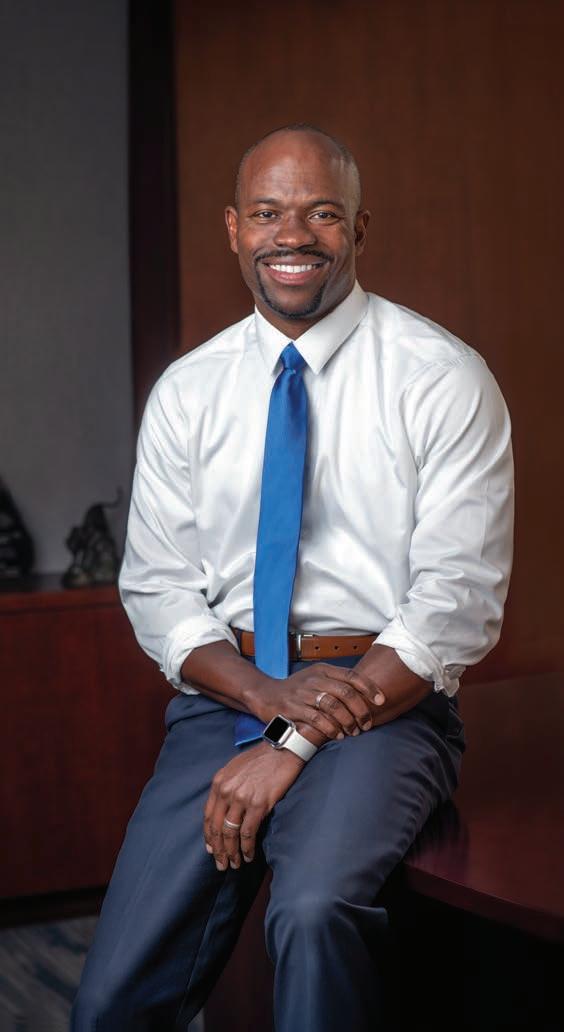
With gratitude to the work and reflections of our students, faculty, staff, alumni and friends, “Blueprint to 2033 – Our Place, Our Time” articulates our bold vision and aspirations for the future. I am so inspired by the rich partnerships and innovative initiatives that the institution will build out over the next decade. Let’s get to work and Go Panthers!

In February 2022, Dr. Nancy Kropf was appointed Senior Vice President for Strategic Initiatives to oversee strategic planning. From March through May, planning and development senators led focus group meetings in their units to determine the strengths, weaknesses, opportunities and threats that would help guide strategic plan development. Four hundred and forty-four faculty and staff participated in 46 focus groups. SWOT data were analyzed by a research team comprised of Dr. Janice Fournillier and doctoral candidate Shae Earls (COEHD). In addition, 56 external stakeholders participated in summer focus groups to provide their input.
In late spring, the strategic planning committee was established. Provost Nicolle ParsonsPollard served as Honorary Chair and Drs. Karen Wheel-Carter and Jared Poley were selected as co-chairs such that the Atlanta and Perimeter campuses were represented in committee leadership. Dr. Kristie Seelman was brought on as Project Coordinator. Each dean nominated a faculty and/or staff member to participate and representation was sought from major administrative units. This yielded a committee of 18 members. Additionally, a student advisory group was organized to provide a forum for student input.
President M. Brian Blake charged the committee in May 2022. The committee met weekly to consider the research report, meet with campus leaders and experts, and construct a draft plan. Founded upon the four pillars articulated by President Blake, a draft plan was presented to university leadership in December.
In January and early February, feedback was solicited more broadly across the university, including university leaders, faculty and staff. Four charettes were held on the Atlanta and Perimeter campuses, and a virtual charette was offered to faculty, staff and students. In the fall and again in the spring, the co-chairs attended meetings of all senate committees to give updates and solicit feedback.
On March 27, the Planning and Development Committee voted to recommend that the strategic plan be approved and adopted at the April 5 meeting of the full university senate.
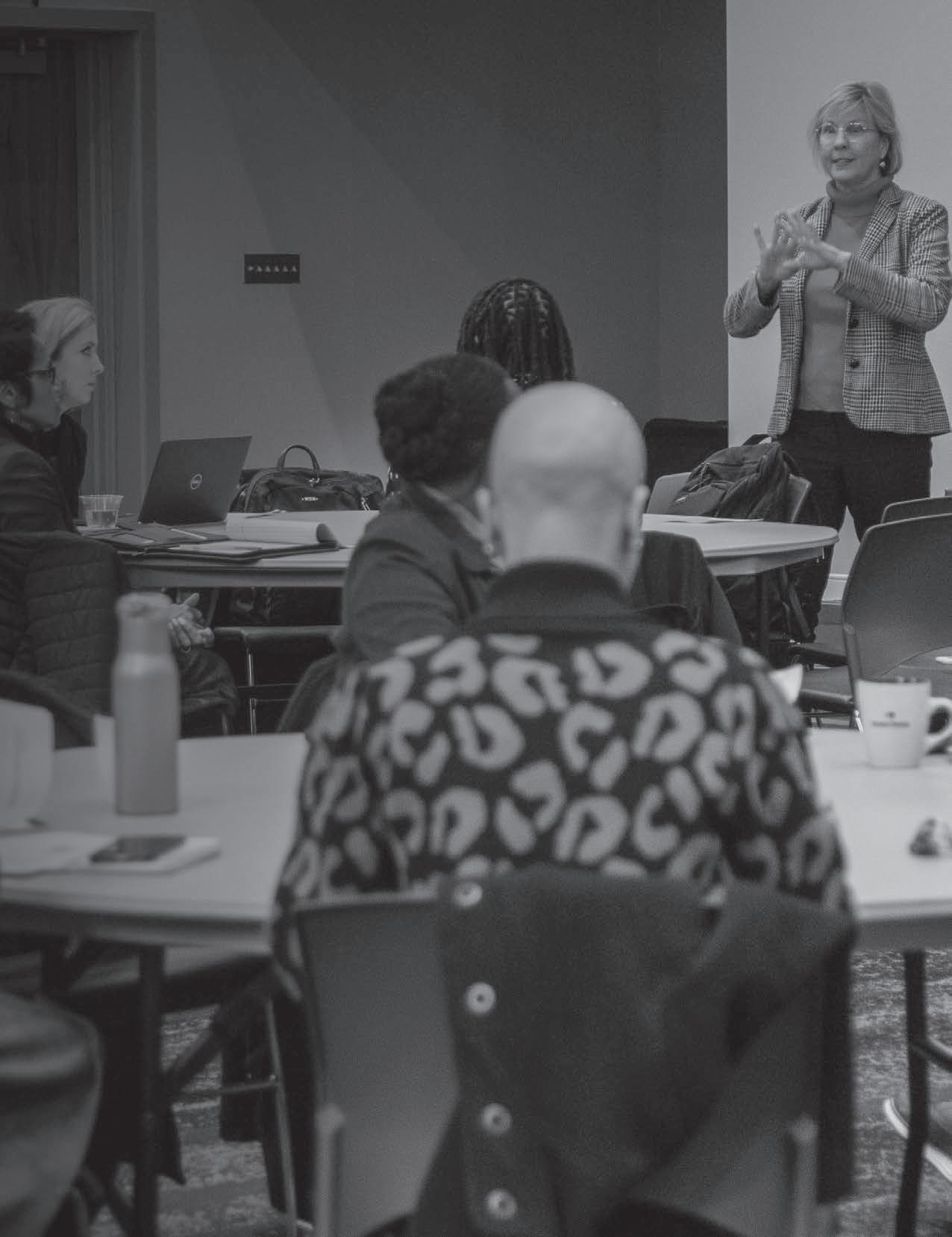
Georgia State University is a globally recognized institution that provides students from all backgrounds access to one of the nation’s most innovative and creative learning environments. We have a distinct identity as the only university in the country designated as a Predominantly Black Institution and a Very High Research Activity Institution with an open-access mission through Perimeter College. In addition, our university holds the designation as an Asian American and Native American Pacific Islander-Serving Institution (AANAPISI), which is further evidence of our diverse student population. As a model for inclusion, we will continue to build equity and recognition for students, staff and faculty while promoting a sense of belonging for all. We value intellectual diversity and the respectful exchange of ideas. We remain socially responsible while we engage our communities and stakeholders as we strengthen our international reputation. Our campus spaces will be inviting, accessible, sustainable, safe and rewarding places for our collective experiences.
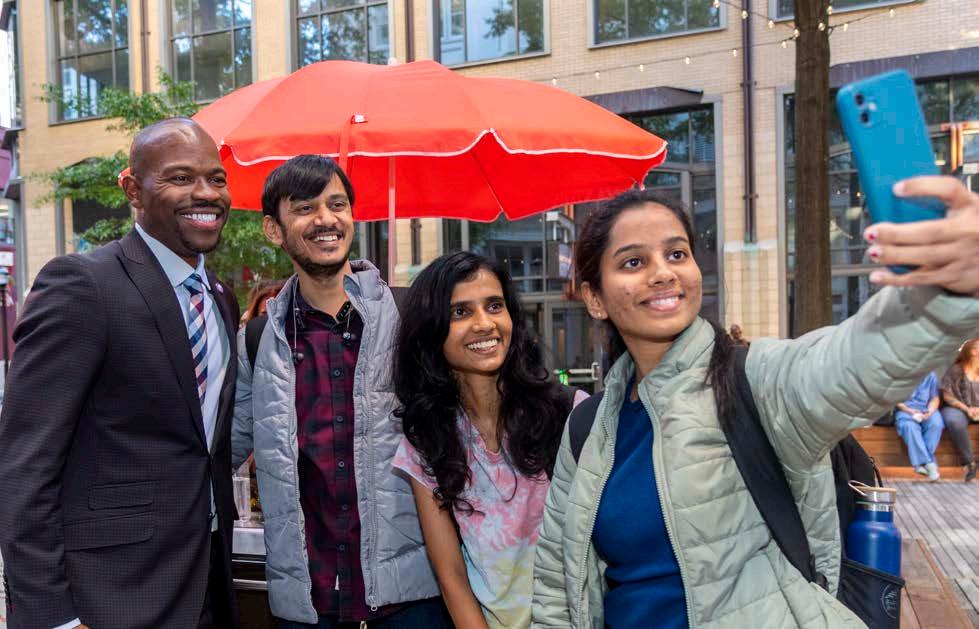
AS A DYNAMIC, MULTI-CAMPUS INSTITUTION, GEORGIA STATE UNIVERSITY WILL BE A PLACE WHERE PEOPLE WANT TO LEARN, STUDY, WORK, LIVE, PLAY AND CONNECT. GSU IS A PLACE FOR ALL!
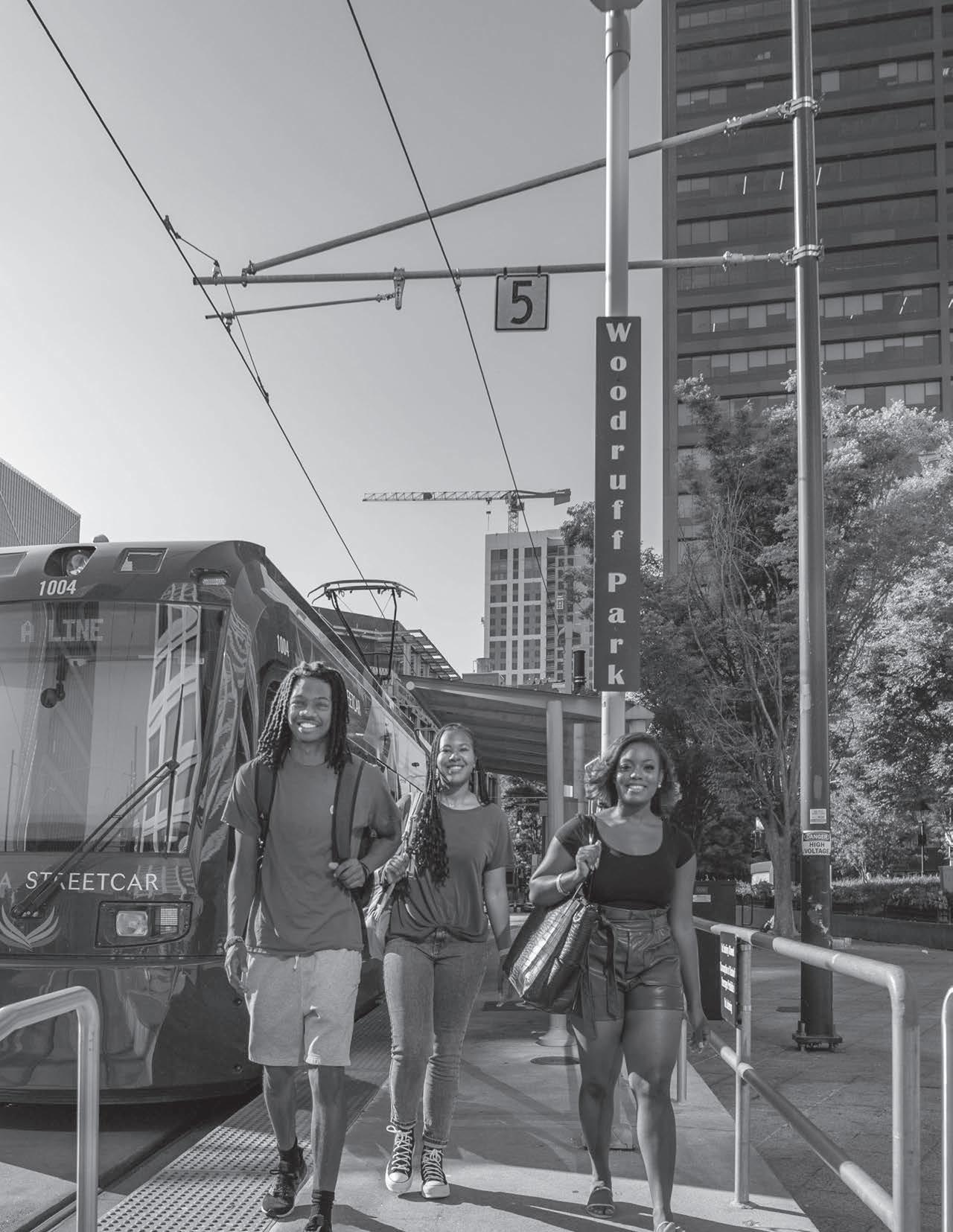
1.1 Elevate Georgia State as a nationally recognized brand and vibrant first-choice destination that promotes belonging, community and acclaim for our research, scholarship, teaching and creative activity.
1.2 Develop curricular and cocurricular programs that explore the surrounding community and connect each campus to its history and unique culture.
1.3 Develop and support traditions that reflect Georgia State’s values and create a shared sense of identity, community and belonging among students, staff, faculty and alumni that are recognized externally.
1.4 Promote Georgia State’s identity as a local, regional and national leader in accessible opportunities for global education while leveraging its location next to the busiest airport in the world and in a region rich in opportunities to grow students’ global and intercultural skills.
2.1 Become a nationally recognized model for student-centric, multipurpose, and flexible spaces to learn, work, live and play that promote a sustainable environment.
2.2 Build world-class facilities that meet the needs of our diverse communities and promote a secure feeling that fosters social engagement, connection and belonging.
2.3 Expand services to promote the physical, emotional and social health of students, staff and faculty.
Create inviting, sustainable and accessible physical and social places where people feel safe and want to learn, study, work, live, play and connect.
3.1 Elevate staff and faculty recruitment, career advancement and retention through equitable and market-competitive compensation as well as personal and professional development opportunities.

3.2 Create a campus culture that encourages transparency, open communication between managers, supervisors and staff, and treats staff members as partners in all institutional endeavors.
3.3 Transform onboarding processes for staff and faculty to acclimate new employees to their work environment, integrate them into the university culture and support them in becoming effective contributors within the workplace.
3.4 Promote staff and faculty engagement in campus community programming, including artistic, cultural, social, athletic, recreational activities and events.
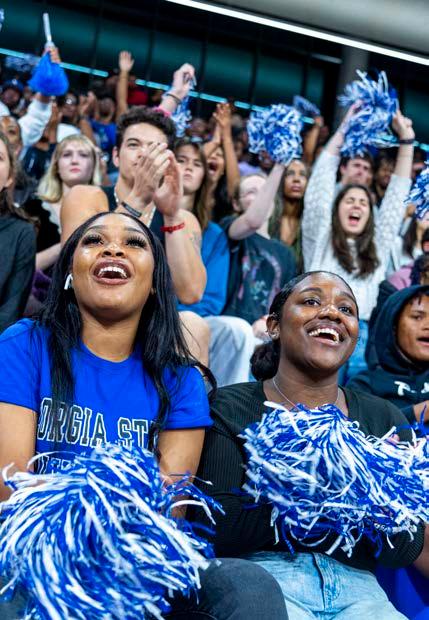

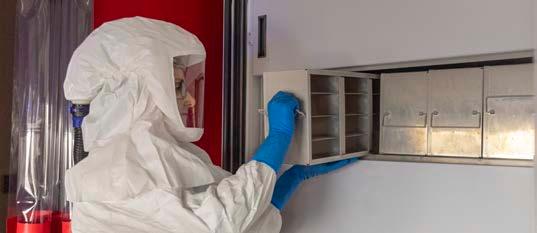
Creating and communicating new knowledge for the public good is at the heart of a research university’s mission. Developing and supporting the impact of that work is critical to the long-term success of Georgia State. We enhance our reputation when we recruit and retain excellent faculty who advance our research, scholarship and creative activities, and integrate this work into teaching.
SCHOLARS FROM ALL DISCIPLINES AT GEORGIA STATE UNIVERSITY PRODUCE NEW KNOWLEDGE THAT TRANSFORMS LIVES AND COMMUNITIES, IMPROVES THE HUMAN CONDITION AND ANSWERS CRITICAL QUESTIONS IN OUR GLOBAL SOCIETY.
GOAL ONE: Enhance Georgia State’s research reputation by recruiting, retaining and advancing faculty and staff devoted to conducting research, scholarship and creative activity.
1.1 Invest in a broad-based plan for recruiting and retaining faculty and staff who increase our capacity for research, scholarship and creative activity. Streamline processes and reform infrastructure to advance productivity and achievement.
1.2 Identify, invest in and scale cross-cutting research that builds and strengthens intellectual community, fosters internal and external partnerships, and offers opportunities to impact academic disciplines, our Atlanta community and our global society.
1.3 Reimagine existing structures to increase efficiency and leverage successful entities to create additional research capacity for increased domestic and global engagement.
GOAL TWO: Embrace an inclusive culture of research, scholarship and creative activity at Georgia State University.
2.1 Augment support for creative and scholarly work in the humanities, social and behavioral sciences, creative fields, and the scholarship of teaching and learning.
2.2 Fuel the research engines of our doctoral and postdoctoral programs to generate the ideas leading the next decade of research, scholarship and creative activity.
2.3 Incubate new faculty-led ventures and innovations with transformational potential and provide opportunities for students to practice innovation and explore entrepreneurship.
2.4 Escalate support for research development, seed and pipeline programs, and mentoring initiatives.
GEORGIA STATE UNIVERSITY BOASTS ONE OF THE MOST DIVERSE STUDENT BODIES IN THE NATION AND CONSISTENTLY DEMONSTRATES THAT STUDENTS FROM ALL BACKGROUNDS CAN SUCCEED AT EQUAL RATES. WE STRIVE TO SUPPORT LEARNERS OF ALL AGES, IDENTITIES AND EXPERIENCES.
OVER THE NEXT 10 YEARS, WE WILL CONTINUE TO IMPROVE RETENTION AND GRADUATION RATES WHILE POSITIONING UNDERGRADUATE AND GRADUATE STUDENTS FOR SUCCESS.
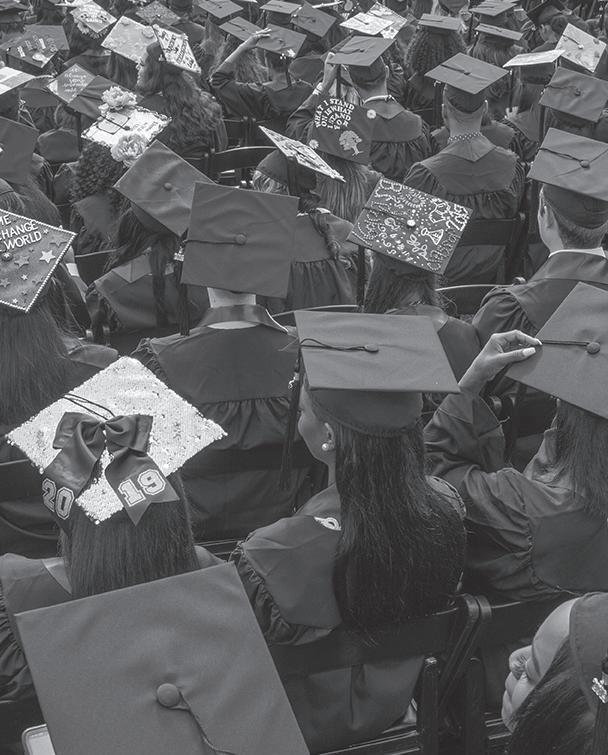
Georgia State is internationally known for its commitment to teaching and innovation and for positively contributing to students’ social mobility. While maintaining our commitment to equity in education, we will expand our national leadership through curricular innovation, greater access to education and reliance on evidence-based student success programs for all students at all levels. Georgia State will create additional ways to increase financial support for students and limit costs in instructional materials and associated expenses of pursuing a degree (e.g., open-access instructional materials, affordable housing options).

GOAL ONE: Build a flexible and interdisciplinary undergraduate curriculum for the future that prepares every student to possess traits that serve as the foundation of academic and lifetime success, like critical thinking, adaptability, communication and evaluation skills, and emotional intelligence.
1.1 E ngage creatively with curricula to equip students with the knowledge, skills and abilities to pursue their academic, professional and personal aspirations by developing degree completion programs, reimagining orientation and perspectives courses, and incorporating high-impact teaching practice into core courses.
1.2 Strengthen quality instruction, interaction and engagement between instructors and students by attending to effective student-faculty ratios, optimal instructional modalities and innovative learning spaces.
1.3 Establish infrastructure to offer undergraduate emerging scholars and their faculty mentors opportunities in research, scholarship and creative activities.
GOAL TWO: Become a national model of educational affordability and accessibility by enhancing academic and financial support infrastructures.
2.1 Promote career readiness and financial support for students by creating oncampus worker-learner programs and integrating career advancement initiatives for students with off-campus employment.
2.2 Expand the academic support staff and use data analysis tools to increase success rates for undergraduate students, ensure class availability, improve transfer and transition processes, and implement academic coaching support for learners.
2.3 Augment access to and actively promote global education programs, including study abroad, international virtual exchange and Global Scholar Distinction courses in each college.
2.4 Expand financial assistance for graduate and undergraduate students to increase degree completion and reduce their financial needs.
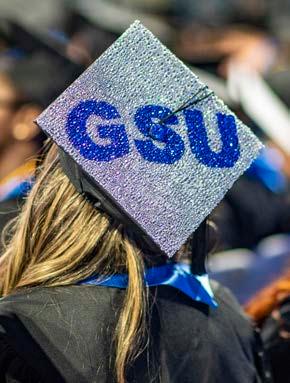
3.1 Diversify and create highly competitive graduate student financial support and professional development resources to enhance engagement in the instructional, research, scholarly and creative missions of the university.

3.2 Expand availability of high-demand degree programs and other credentials at the graduate level with attention to student needs around instructional modality (online, face-to-face, hybrid), affordability and connection to local, national and global workforce needs.
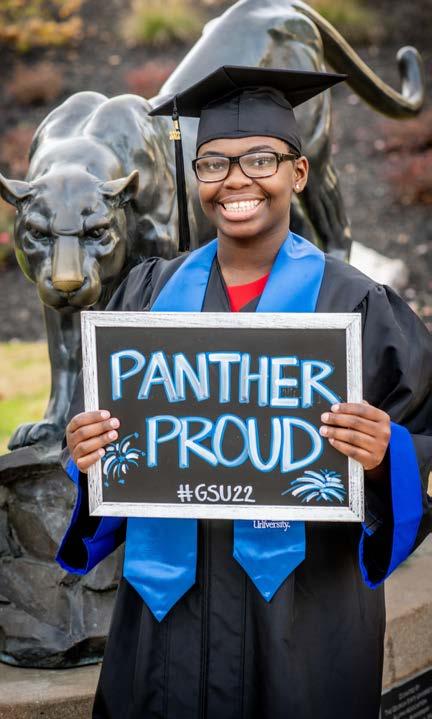
3.3 Adapt the tools and strategies that have made Georgia State a national model for undergraduate student success to graduate students in support of retention and degree completion.

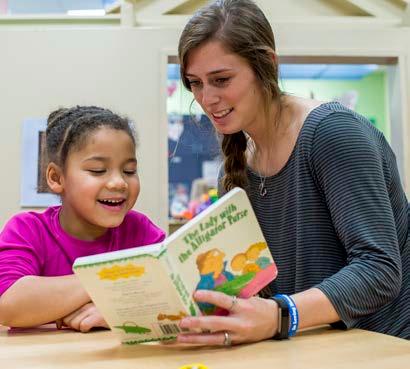

Georgia State University recognizes that organizations are seeking graduates with a combination of high-demand skills and competencies, unique learning experiences and a passion for positively impacting the world. Over the next 10 years, we will become the university that is “moving at the speed of change” to both anticipate the needs of employers and equip our students to reach their full potential in careers and life. Georgia State graduates will be leaders in Georgia’s workforce and beyond. They will enjoy greater opportunities as a result of their immersion in experiential learning, highdemand competency and skill building, and a diverse community of learners. An enhanced infrastructure to facilitate collaboration between faculty, staff and external partners will provide accessible postgraduate opportunities for our students.

STUDENTS FROM ALL BACKGROUNDS DESERVE THE OPPORTUNITY TO ACHIEVE THEIR FULL POTENTIAL IN THEIR CAREERS AND LIVES.
GEORGIA STATE UNIVERSITY PREPARES DIVERSE POPULATIONS OF UNDERGRADUATE AND GRADUATE STUDENTS ACROSS THE LIFE COURSE TO PURSUE THEIR CHOSEN FIELDS WITH ADAPTABILITY, AGILITY AND CREATIVITY. OUR STUDENTS ARE PRIMED TO BE ENGAGED CITIZENS, COMMUNITY LEADERS AND INNOVATORS, AND EFFECTIVE COLLABORATORS WHO GIVE BACK TO SOCIETY.
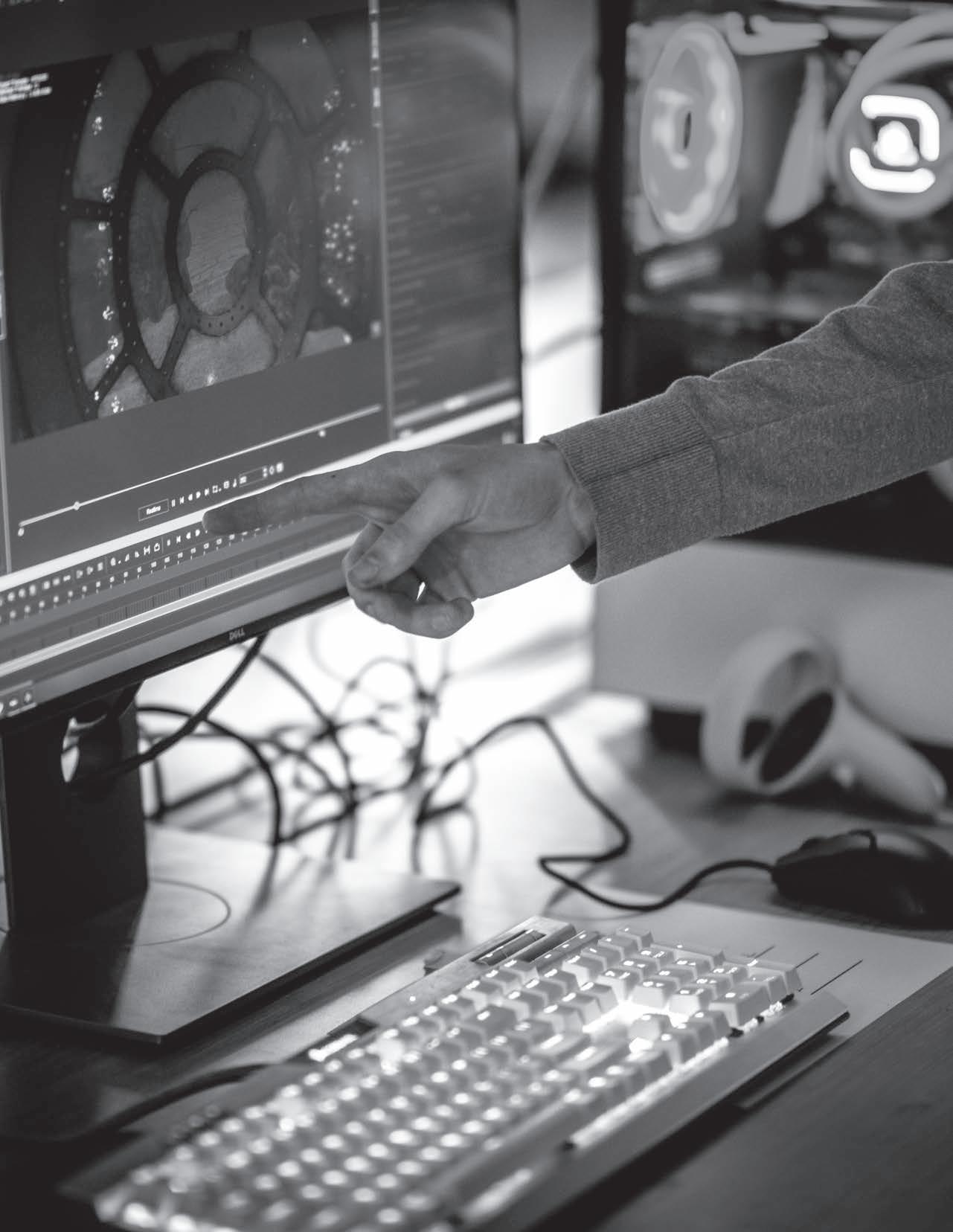
1.1 Strategically enhance and organize Career Services and College-to-Career initiatives and increase engagement of alumni, external partners, local communities and prospective learners in career-readiness programs.
1.2 Develop students’ digital skills through an infusion of content into the general education curriculum and through certificates or microcredentialing at the undergraduate and graduate levels.
1.3 E xpand faculty’s use of educational technology tools and practices to broaden students’ exposure to career-relevant simulations, emerging technologies, collaborations with diverse teams (including local, national and international exchanges and partnerships) and applied work.
1.4 B ecome a lifelong learning partner by extending career guidance and access to training for advancement and skill development to alumni, community members and prospective students.
2.1 Support faculty to increase the use of high-impact practices, such as experiential, project-based and service-learning opportunities across the curriculum that promote leadership, teamwork, civic engagement and problem-solving.
2.2 Promote Georgia State’s core curriculum as one that prepares every student to be a lifelong learner and engaged citizen by developing skills and competencies needed by employers, such as the ability to think critically, communicate effectively, lead, collaborate, understand and solve complex problems, research independently, analyze complex data, consider different perspectives, engage civically and reason ethically.
Ensure that every student has continuing exposure to career services, high-demand competencies and emerging technologies.
GOAL
Increase opportunities for experiential and service-learning for every Georgia State student to help prepare society’s changemakers of the future.
GOAL THREE: Expand mutually beneficial partnerships with state, national and international industry, government and nonprofit organizations that leverage Georgia State’s expertise and create opportunities for research, scholarship, learning, creativity and innovation.
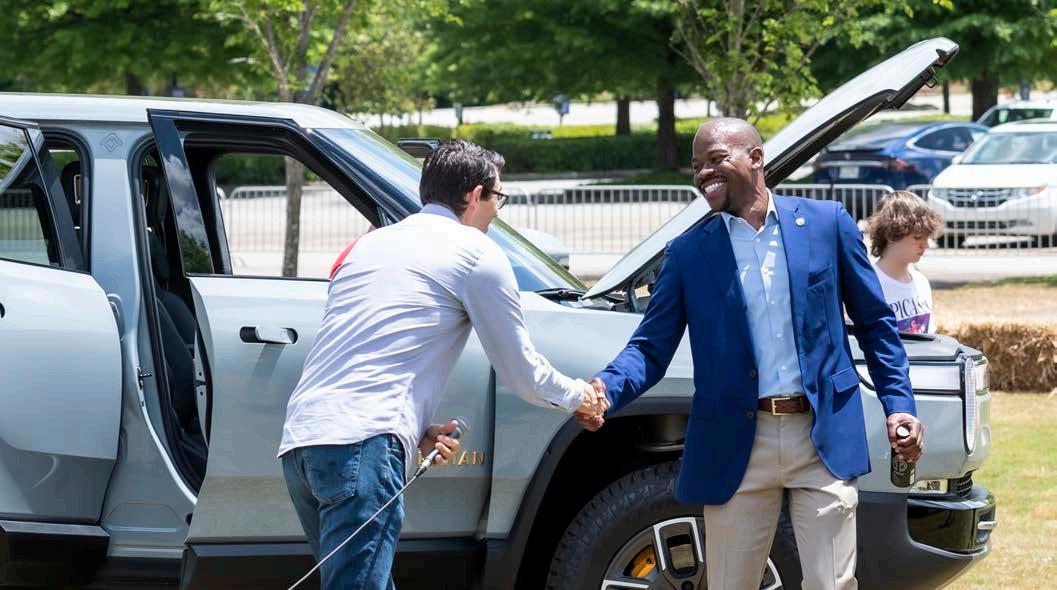
3.1 Form a university gateway for external organizations to connect with multiple areas within the university and develop co-branded satellite work/office spaces to foster learning opportunities on GSU campuses.
3.2 Extend continuing and professional education opportunities through external partnerships and programs that are responsive to employer needs and enable all to thrive in the workforce of the future.
3.3 Establish central coordinating structures to connect students with Georgia’s local, regional and international internship opportunities, and enable their participation.